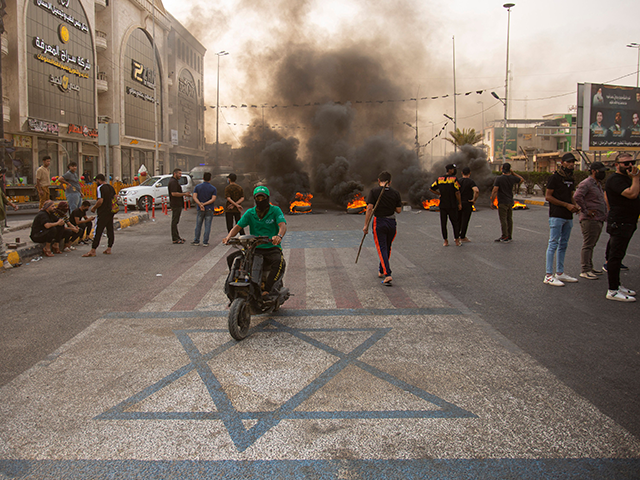Powerful Iraqi Shiite cleric Moqtada al-Sadr announced his “final withdrawal” from politics on Monday, citing his frustration with the paralyzed Iraqi system.
His supporters, who have been holding a “sit-in” in the Green Zone of Baghdad for several weeks, erupted into violence and stormed several government buildings. Helicopters have been seen landing at the U.S. Embassy in Baghdad, possibly to evacuate personnel.
Moqtada al-Sadr is the most influential Shiite leader in Iraq who is not aligned with Iran. The fiery cleric formed a political party that did very well in parliamentary elections in October, but in June he announced he had run out of patience with Baghdad politics and ordered all 73 of his newly-elected lawmakers to resign, throwing the government into an even worse crisis.
Swarms of the cleric’s angry Sadrist followers began flooding into the Green Zone for protests and sit-ins, at one point occupying the parliamentary building until Sadr told them to leave — a rather blunt demonstration of his power on the streets.
On Monday, Sadr excoriated the Iraqi political system for failing to put together a working government for the past ten months — a task made more difficult by Sadr’s penchant for using his street muscle to veto every candidate he saw as corrupt — and instructed his political party to shut down its offices.
“I hereby announce my final withdrawal,” he said on Twitter. His final political demand was for new elections after the complete dissolution of parliament, with a special restriction that no one who has held office since the U.S. invasion in 2003 can run again.
The Arab Weekly thought Sadr might have acted in anger after another major Shiite leader, Ayatollah Kadhim al-Haeri, announced his retirement on Sunday and urged his followers to throw their support behind Iranian Supreme Leader Ayatollah Ali Khamenei.
Haeri lives in Iran but was a top adviser to Sadr and popular among his followers, so endorsing Khamenei was a clear threat to Sadr’s influence. Haeri also denounced Israel, the United States, and loyalists of deposed dictator Saddam Hussein’s Baath Party in his retirement statement.
Sadr said on Monday that he thought Haeri acted under coercion, so his decision to step down “was not out of his own volition.”
Sadr has pronounced himself disgusted and ostentatiously quit politics several times in the past. His endgame on this occasion is not easily determined.
“It’s not quite clear what he is resigning from. Is he asking the other members of his party that hold bureaucratic positions in the state to resign? That’s to be seen. He has done this many times and usually when he does claim to be withdrawing or resigning from the political system, it’s usually before elections and he always ends up backtracking,” Hamzeh Hadad of the European Council on Foreign Relations told Al Jazeera News.
The legion of Sadr supporters camped in the Green Zone went berserk after his announcement. Hundreds of Sadrists swarmed over cement barriers to storm the government’s Republican Palace, ignoring calls from the Iraqi military to withdraw immediately.
Some of the protesters decided to avail themselves of the swimming pool at the presidential palace:
“A full curfew in the capital Baghdad affects all vehicles and citizens” beginning at 3:30 p.m. local time, the military Joint Operations Command said on Monday. Caretaker Prime Minister Mustafa al-Kadhimi, who is allied with Sadr, said cabinet meetings will be suspended until further notice.
“The dangerous developments that took place in our dear Iraq today, from the demonstrators storming the Green Zone and entering government institutions, indicate the seriousness of the consequences of the continuation and accumulation of political differences,” Kadhimi said.
The Jerusalem Post reported gunfire was heard in the Green Zone on Monday afternoon, reportedly because Shiite militias loyal to Iran are shooting at the Sadrists. A sizable contingent of pro-Iranian Shiite protesters have been camped in the Green Zone as a counter-protest against Sadr’s followers.
Agence France-Presse (AFP) also reported live rounds fired in Baghdad by pro-Iranian militia, as well as tear gas deployed by Iraqi security forces. The Associated Press reported late Monday morning that at least one demonstrator has been killed in “clashes with security forces.”

COMMENTS
Please let us know if you're having issues with commenting.